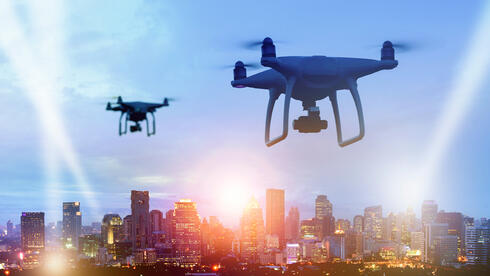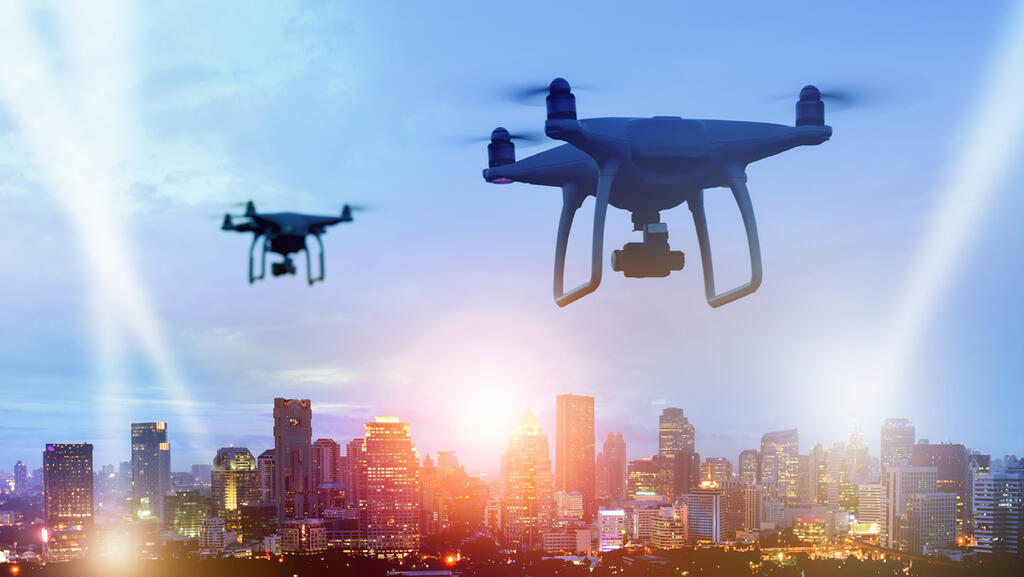
“People are very suspicious of Israel. But we have to show the world that our drones are still ahead of the curve.”
As the private sector expands civilian use of drones, history shows Israel’s past prominence in their development but scrutiny in their present. “No doubt that we were the pioneers” in the military drone industry, noted former Israeli Air Force Commander Eitan Ben Eliyahu
Civilians are preparing for a future where their Amazon parcels are delivered from the sky: unmanned aerial vehicles (UAVs) that travel across rural and urban areas to deliver medicines, food, and other items directly to their homes. The technology still relies on bureaucratic and regulatory headaches to win over skeptical minds and remain safe, and Israel’s role in the ecosystem has entered new scrutiny amid its war actions taken with Hamas.
It is a technology that was born decades ago in the military context. Most significantly, it was the Israeli Defense Forces that was designing the technology that would one day be used by the Americans to show the world what was now becoming capable.
“We were the only army and the only military force who developed and used the UAV,” said Major Gen. (Ret.) Eitan Ben Eliyahu, the former Commander of the Israeli Air Force, thinking back to 1970. “The second air power who recognized the need was the Americans. They actually started in the late 1980s through DARPA [Defense Advanced Research Projects Agency].”
Ben Eliyahu was speaking to CTech ahead of the World's Unmanned Aerial Vehicle Conference held this month in Jerusalem. The conference revealed the latest innovations and developments in the world of drones, especially in light of The Swords of Iron War. It also emphasized the world of UAVs and drones in today’s civilian market, the integration of AI in the aviation world, and the future of the industry.
The conference took place amid UK protests that call to stop the export of weapons to Israel and how its use of AI in Gaza comes under closer scrutiny from allies and critics alike.
As chairman of the conference and one of its initiators, Ben Eliyahu comes with a unique perspective. As the 13th Commander in Chief of the Israeli Air Force, he enlisted in the IDF in October 1962 and served as an Ouragan pilot during the Six Day War in 1967. “DARPA spent a lot of money and they have learned a lot from us. And this is how it actually penetrated into the American military forces.”
Israel’s drone origins can be traced back to the 1970s with the development of the IAI Scout drone, a reconnaissance unmanned air vehicle by Israel Aircraft Industries. It was first deployed in 1981 in combat missions by the South African Defense Force but a year later Israel was destined to use them in the 1982 Lebanon War when confronted with Syrian surface-to-air missiles.
As years went by, Israel continued its development of military technology and sought partnerships with powerhouses like the American military, which first started experimenting with drones as early as WWII but whose advancement evolved throughout the Cold War Era up to the Persian Gulf War, as exampled by the Pioneer UAV used for real-time surveillance and target acquisition.
These decades proved crucial for how drones could be used in wartime. Today, Israel is dependent on technology when protecting its citizens from threats by Hezbollah in the north and Hamas in the south. As recently as March 2024, Iran launched a 250-suicide drone attack intended to disrupt the nation and the IDF continues to use drones both as a defense and attack method to deal with its enemies. America, too, has expanded its use of drones including the so-called “War on Terror” post-9/11 which saw increased use from President Bush and President Obama highlighting their military importance but also posing questions regarding ethical considerations.
As with many military inventions, such as GPS systems and microwave units, the technology has been slowly seeping into civilian use and commercial markets - only making questions of ethics and regulations more pressing. Israel’s defense sector itself is booming: IAI today is seeing a 200% increase in job applications and in the past five years, American VC funding for defense tech has increased by roughly 150% from $12.6B to $31.5B, 10 times the rise in overall funding which saw a 15% increase.
Many of us have already seen private drones flying around taking extraordinary photos of scenic landscapes, but the time is arriving for governments to gather to discuss how private and commercial adoption of drones may fill up our skies - once again playing catch up with the innovation of tech hubs globally.
3 View gallery


Jerusalem mayor Moshe Leon with Eitan Ben Eliyahu and Ofer Gil
(Photo: Shmulik Shalish)
“If you want it to be a viable market, you want the regulation to be aligned with what's going on in the world,” added Israel Innovation Authority’s Daniella Partem. “It has to be also an international project… What we learned is that if you want to create an economically viable ecosystem that supports different types of usages in different types of sectors, like the private sector, the public sector, health, food industry, and homeland security, you have to create an open sky.”
Partem is the Head of C4IR Israel, the Center for the Fourth Industrial Revolution. It's a collaboration of the Israel Innovation Authority with the World Economic Forum to promote the development and implementation of disruptive technologies. According to Partem, it is dedicated to projects that focus on more complicated regulatory issues, such as drones.
As such, it has launched The Israel National Drone initiative which created a guide and governmental collaboration to work with the private sector and Israel’s high-tech ecosystem for drone technologies. “We've heard a lot since October 7 about the usage of drones in the defense sector and how it's becoming more popular and combat and development in that sector, but we are fully focused on the civilian sector,” she clarified.
Israel is currently the home of several projects that study the implementation of commercial and civilian use cases, inspired by technology that was born in the IDF. For example, delivering medical supplies to rural areas, working with traffic management fleets, or meeting with legal companies to discuss regulatory hurdles in line with other regions such as the European Union.
To date, the IAI has conducted more than 23,000 flights across Israel over the last four years, notably for 18 periphery hospitals that can be connected to life-saving medicines quickly without having to store them on-site.
Partem participated on a panel at the World's Unmanned Aerial Vehicle Conference to discuss the National Drone Project, appearing alongside Liron Stern of the Israeli Civil Aviation Authority; Meital Goren Illouz, Director of Implementation of Autonomous Technologies at Ayalon Highways, and Sapir Ifergan, Director of the Transportation and Aviation Team, Budget Division from the Ministry of Finance - all of whom are key members.
“In a few years, we really managed to become one of the leading countries in the field,” Partem told CTech ahead of the panel. “In terms of the number of flights we've been doing in challenging areas, urban areas, in a managed airspace… I think [it’s] one of the most progressive sandboxes or skyboxes in the world. So that's what we're trying to show: how this collaboration can lead to something very positive.”
Israel’s outlook on drones may be optimistic - starting as a pioneer and continuing to a leader - but challenges in the commercial space still lie ahead. It remains a very expensive venture and the ecosystem is not yet economically viable. There is also the question of their overall safety. Partem acknowledges how a single accident from an autonomous car could send the industry “10 years back” in terms of development and implementation, and the same standards apply to drones. Therefore safety remains the number one priority.
Another admission relates to Israel’s current place on the world stage with the ongoing war in Gaza and increased scrutiny imposed on Israel in how its military is responding to the threat of Hamas. While Israel intends to remain a leader in the drone field, Partem confirms that “challenges lie ahead” and even though the ecosystem is working hard, there is an inevitable “bureaucratic and diplomatic headache” of having Israel lead that revolution. “People are very suspicious of Israel at the moment,” she said. “I feel that's our role now: We have to keep going and show the world that we're still ahead of the curve.”
As the world prepares to expect more drones in its skies (there are 30,000 non-registered drones in Israel alone), Israel must now navigate its role as a leading voice in the drone industry as it expands from military applications to commercial use. This will take place over several years and amid a war setting that compromises Israel’s position on the world stage. Despite this, Startup Nation and the IDF remain dedicated to the cause and to uphold their status in the industry. “No doubt that we were the pioneers,” concluded Ben Eliyahu. “No doubt about that.”















